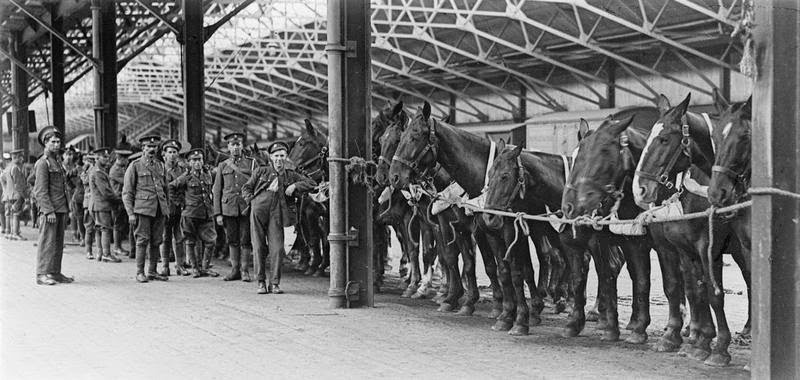The 277th Brigade RFA
 |
Horses of an Artillery Brigade awaiting embarkation on a train. The whole of the army was dependent on horses for most of its transport needs. Each Field artillery gun was usually pulled by six horses.
Picture courtesy of the Imperial War Museum Collection Q3042 |
The
277th RFA started life as the 12th, 13th and 14th Lancashire Batteries and were originally attached to the 55th
West Lancashire Division, Territorial Forces. These eventually were renamed the 277th Brigade in May 1916, after they rejoined the 55th West Lancashire Division (January 1916)
After the Boer War, the
Government and Army realized that the small standing Army of the
Empire was insufficient for modern needs, and in 1908 the Territorial
Forces came into being, and trained and were equipped as the Regular Army.
Though they were raised to serve on the home front only, at the
outbreak of World War 1, many volunteered for service at the front.
The
277th did not go into action immediately, and when they did go off to
France in late 1915, the West Lancashire Batteries were attached to the 2nd Canadian
Division who were still getting their artillery up to strength and a
suitable level of competence. Before embarkation they exchanged their rather out-dated 15 pounder guns for the standard 18 pounders (qv).
The 277th saw action on the Somme in 1916, but were moved again in January of
1917 to become an Army Brigade under the more centralized command of
the newly re-organised Royal Field Artillery. Logistically, this made
sense, because moving vast numbers of horses, guns and men to
different sectors of the front (traditionally following their parent
Division), on a fairly regular basis, did not make much sense as it
was a highly dangerous and frequently complicated exercise.
The Brigade saw action in all of the major battles from October 1915 to the Armistice in November 1918, including The Battles of the Somme, the latter Battles of Ypres (Including Passchendaele).
In order to clarify what happened and when, I am going to start a page attached to this Blog which gives a transcription of the official War Diaries, the originals of which are housed in the National Archives and the Royal Artillery Museum at Woolwich. As these were handwritten, there may be some items which are difficult to interpret. These will be indicated by (?) sign. I hope you find them interesting and useful.
The War Diary Page will be updated, regularly. I hope to be able to post commentaries on the diary to show how the action of the Brigade fitted into the way the War was unfolding, as it progresses.
In addition, I will be producing a page about men in the 277th Brigade, and some notes on various technical issues such as map references and technical terminology.




